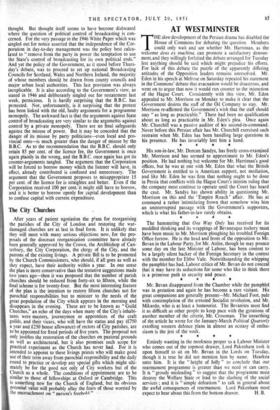The City Churches
After years of patient ngotiation the plans for reorganising the parishes of the City of London and restoring the war- damaged churches are at last in final form. It is unlikely that they will meet with many serious objections now, for the pro- posals of the diocesan reorganisation committee have already been generally approved by the Crown, the Archbishop of Can- terbury, the City Corporation, the clergy of the City, and the patrons of the existing livings. A private Bill is to be promoted by the Church Commissioners, who should, if all goes as well as they expect, have their authority within a year. In one sense the plan is more conservative than the tentative suggestions made two years ago—then it was proposed that the number of parish churches should he reduced from forty-six to fifteen, while the final scheme is for twenty-four. But the most interesting feature of the plan is the intention to restore fifteen churches not for parochial responsibilities but to minister to the needs of the great population of the City which appears in the morning and disappears in the evening. These are to be known as " Guild Churches," an echo of the days when many of the City's inhabi- tants were masters, journeymen or apprentices of the craft guilds, and their vicars, who will have the status and pay (£750 a year and £250 house allowance) of rectors of City parishes, are to be appointed for fixed periods of five years. The proposal not only justifies the restoration of the churches on pastoral grounds as well as architectural, but it also promises such scope for practical experiment as the Church has never had. For it is intended to appoint to these livings priests who will make good use of their term away from parochial responsibility and the daily round to practice or develop any special gifts which might ulti- mately be for the good not only of City workers but of the Church as a whole. The conditions of appointment are to be similar to those of fellowships at Oxford or Cambridge. This is something new for the Church of England, but its obvious potential value will probably allay the fears of those worried by the encroachment on " narson's freehntd."


































 Previous page
Previous page